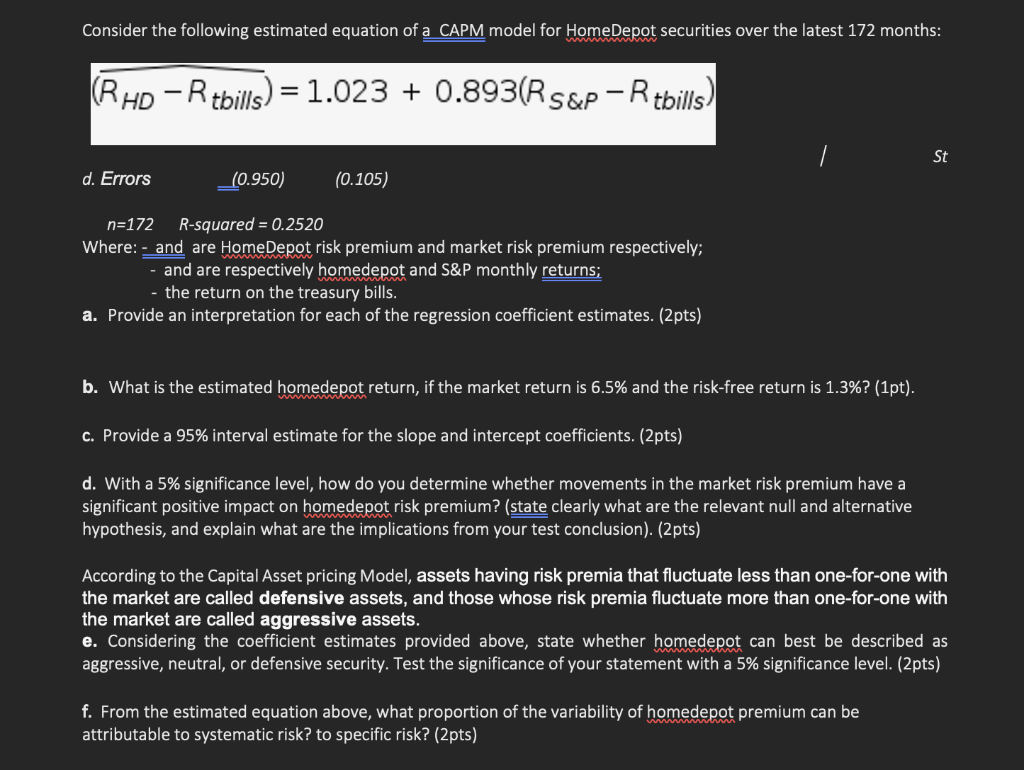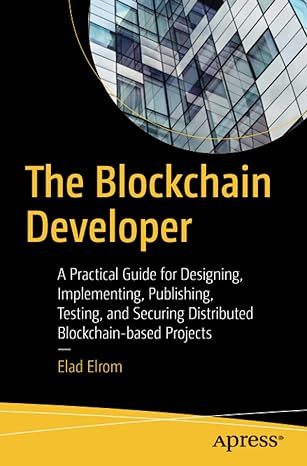
Consider the following estimated equation of a CAPM model for Home Depot securities over the latest 172 months: (RHD -Rtbills) = 1.023 + 0.893(RS&P-Rtbills) == St d. Errors (0.950) (0.105) n=172 R-squared = 0.2520 Where: - and are Home Depot risk premium and market risk premium respectively; and are respectively homedepot and S&P monthly returns; - the return on the treasury bills. a. Provide an interpretation for each of the regression coefficient estimates. (2pts) b. What is the estimated homedepot return, if the market return is 6.5% and the risk-free return is 1.3%? (1pt). c. Provide a 95% interval estimate for the slope and intercept coefficients. (2pts) d. With a 5% significance level, how do you determine whether movements in the market risk premium have a significant positive impact on homedepot risk premium? (state clearly what are the relevant null and alternative hypothesis, and explain what are the implications from your test conclusion). (2pts) According to the Capital Asset pricing Model, assets having risk premia that fluctuate less than one-for-one with the market are called defensive assets, and those whose risk premia fluctuate more than one-for-one with the market are called aggressive assets. e. Considering the coefficient estimates provided above, state whether homedepot can best be described as aggressive, neutral, or defensive security. Test the significance of your statement with a 5% significance level. (2pts) f. From the estimated equation above, what proportion of the variability of homedepot premium can be attributable to systematic risk? to specific risk? (2pts) Consider the following estimated equation of a CAPM model for Home Depot securities over the latest 172 months: (RHD -Rtbills) = 1.023 + 0.893(RS&P-Rtbills) == St d. Errors (0.950) (0.105) n=172 R-squared = 0.2520 Where: - and are Home Depot risk premium and market risk premium respectively; and are respectively homedepot and S&P monthly returns; - the return on the treasury bills. a. Provide an interpretation for each of the regression coefficient estimates. (2pts) b. What is the estimated homedepot return, if the market return is 6.5% and the risk-free return is 1.3%? (1pt). c. Provide a 95% interval estimate for the slope and intercept coefficients. (2pts) d. With a 5% significance level, how do you determine whether movements in the market risk premium have a significant positive impact on homedepot risk premium? (state clearly what are the relevant null and alternative hypothesis, and explain what are the implications from your test conclusion). (2pts) According to the Capital Asset pricing Model, assets having risk premia that fluctuate less than one-for-one with the market are called defensive assets, and those whose risk premia fluctuate more than one-for-one with the market are called aggressive assets. e. Considering the coefficient estimates provided above, state whether homedepot can best be described as aggressive, neutral, or defensive security. Test the significance of your statement with a 5% significance level. (2pts) f. From the estimated equation above, what proportion of the variability of homedepot premium can be attributable to systematic risk? to specific risk? (2pts)







